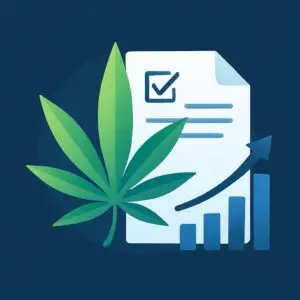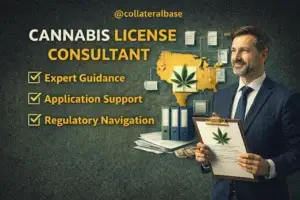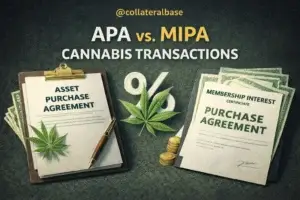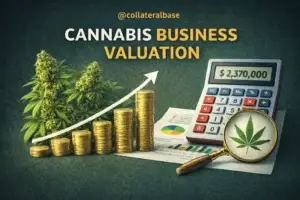Overview of Cannabis License Applications
 The expansion of adult‑use and medical cannabis markets across the United States has opened opportunities for entrepreneurs and investors, but it has also created a labyrinth of regulations. Every state defines its own license classes, ownership limits and application requirements. Sophisticated applicants treat licensing not as a simple bureaucratic hurdle but as a cornerstone of their business strategy. This article delivers a high‑level analysis of the major cannabis license categories, outlines the application frameworks used by leading jurisdictions and explores how cost structures and social‑equity incentives can shape investment decisions. For those who want a more hands‑on approach, our licensing consulting services offer turnkey support from planning through application and compliance.
The expansion of adult‑use and medical cannabis markets across the United States has opened opportunities for entrepreneurs and investors, but it has also created a labyrinth of regulations. Every state defines its own license classes, ownership limits and application requirements. Sophisticated applicants treat licensing not as a simple bureaucratic hurdle but as a cornerstone of their business strategy. This article delivers a high‑level analysis of the major cannabis license categories, outlines the application frameworks used by leading jurisdictions and explores how cost structures and social‑equity incentives can shape investment decisions. For those who want a more hands‑on approach, our licensing consulting services offer turnkey support from planning through application and compliance.
License categories and strategic considerations
Cultivation
Commercial cannabis cultivation licenses are stratified by canopy size and lighting method. California’s Department of Cannabis Control (DCC) recognizes specialty cottage, specialty, small, medium and large categories with specific square‑footage limits. Indoor and mixed‑light operations require adherence to wattage limits, and license fees increase with canopy size. For strategic investors, tier selection affects not only cost but also the ability to scale. Smaller tiers may offer faster approval and lower fees but restrict production capacity.
Manufacturing/processing
Processing licenses control the manufacture of oils, extracts and infused products. California issues several sub‑types: Type 7 (volatile solvent extraction), Type 6 (non‑volatile solvent and mechanical extraction), Type N (infusion), Type P (packaging and labeling) and Type S (shared‑use facilities). Each sub‑type carries different insurance, safety and environmental requirements. A strategic operator might start with a non‑volatile Type 6 license to reduce compliance burdens, then add a volatile Type 7 license once capital and expertise allow.
Distribution and logistics
Distribution licenses facilitate the movement of cannabis between licensees and to retailers. California’s Type 11 distributor license authorizes storage, transport and testing arrangements, while Type 13 covers transport‑only activity. A vertically integrated operator can use a distribution license to consolidate supply chain control, but regulators often restrict common ownership to prevent monopoly power. In New York, distribution is tightly linked to cultivator and processor licenses; independent distributors may emerge as a niche opportunity.
Retail and dispensary
Retail licenses represent the consumer‑facing end of the supply chain. California distinguishes between storefront (Type 10) and delivery‑only (Type 9) retailers. New York’s retail dispensary license prohibits vertical integration and limits an individual to three dispensaries. Strategic retail applicants must secure real estate that complies with buffer zones (e.g., at least 500 ft from schools and 200 ft from houses of worship in New York) and develop robust compliance programs for ID verification, security and track‑and‑trace systems.
For a step‑by‑step blueprint on launching a storefront or delivery service, including site selection, zoning and startup costs, see our guide on how to open a dispensary business.
Microbusiness
Microbusiness licenses are designed for small operators who wish to control multiple segments of the value chain without building large infrastructure. California’s Type 12 microbusiness license requires the licensee to perform at least three activities – such as cultivation (up to 10 000 sq ft), non‑volatile manufacturing, distribution, retail, nursery or processing. New York’s microbusiness license similarly allows cultivation, processing, distribution and delivery but forbids holding other adult‑use licenses. From a strategic standpoint, microbusinesses allow entrepreneurs to capture higher margins and retain brand control, but they must stay within strict production caps.
Testing laboratories, nurseries and events
Independent testing labs (Type 8 in California) must hold ISO/IEC 17025 accreditation and cannot have financial ties to cultivators or retailers. Nursery licenses authorize the sale of clones and seeds, pairing a nursery with a cultivation license can diversify revenue. Event and on‑site consumption licenses are emerging categories—California issues separate organizer and temporary event permits, while New York anticipates releasing on‑site consumption, delivery and cooperative licenses in future application windows. Investors should monitor these categories for hospitality and tourism opportunities.
Application frameworks and regulatory milestones
Most jurisdictions employ a multi‑part application process that verifies local zoning compliance, operational readiness and ownership disclosures. California’s DCC outlines nine steps: secure local permitting, study state regulations, assemble documentation, create an online account, complete the application, pay the fee, respond to regulator inquiries, pay the license fee and post the license on premises.
New York divides its adult‑use application into four sections: the primary application, Social and Economic Equity (SEE) certification, True Party of Interest (TPI) disclosures and the location & operations section. Failing to complete any section will delay review.
For investors and entrepreneurs, timing matters. Some states award licenses via merit‑based scoring or lotteries; others issue rolling approvals. Understanding the regulatory calendar and building compliance into your project timeline are critical components of strategic planning.
Licensing rounds: merit‑based, complete applications & lottery
In the early days of legalization, regulators relied on competitive merit‑based scoring. Applicants were judged on business plans, security protocols, community benefits and diversity commitments, and only a few winners received licenses. This approach led to numerous lawsuits from unsuccessful applicants, causing delays and uncertainty.
Some jurisdictions experimented with issuing licenses to every complete application. Oklahoma’s medical cannabis program issued thousands of licenses under this model, prompting concerns about oversupply and market saturation.
Today, many states use a lottery to allocate limited licenses. Illinois, Missouri and Ohio have all conducted random drawings for dispensary or microbusiness licenses. Typically, regulators ensure that applications meet baseline compliance, then hold a public drawing to pick winners. This reduces the perception of favoritism and tends to survive legal challenges.
States may cap the total number of licenses at the state level or allow municipalities to set their own limits. Understanding whether you are dealing with a state‑wide cap or a municipal cap is crucial for market analysis and site selection.
For more background, see the Marijuana Policy Project’s Breakdown of Application, Licensing and Renewal Fees and the National Conference of State Legislatures’ State Medical Cannabis Laws, which offer comparisons across jurisdictions.
Fee structures and capital planning
Fees can materially impact your pro‑forma financials. The Marijuana Policy Project notes that application fees range from $100 for small growers in Maine and Massachusetts to $6 000 in Michigan, while licensing fees range from $9 per plant to $850 000 for large Illinois cultivation centers. These fees may be one‑time or annual and often scale with canopy size or gross revenue.
Strategic applicants should also account for the cost of real estate, security systems, insurance, professional fees and compliance software. Social‑equity applicants may benefit from reduced fees and access to low‑interest loans. In New York, SEE applicants receive a 50 % reduction in application and licensing fees and priority review. Jurisdictions like Illinois have earmarked fee revenues for social‑equity grants and loans. For a deep dive into eligibility criteria and how to structure ownership to qualify, read our social equity primer.
Ownership limits, True Parties of Interest and compliance
Understanding ownership restrictions is essential for capital structuring. New York’s TPI framework classifies any person with the right to more than 10 % of gross revenue, 50 % of net profits or $250 000 as a True Party of Interest. All TPIs must be disclosed, and their affiliations may limit the number of licenses they can hold. Retail dispensaries cannot hold other adult‑use licenses, while delivery licensees are capped at one license. California has different cross‑ownership rules but similarly restricts common ownership of testing labs to prevent conflicts.
Due diligence on capitalization tables, investor rights and management agreements is therefore not optional; it is integral to compliance. Failure to identify a hidden TPI can result in denial or revocation.
FAQs for sophisticated applicants
How do social‑equity programs influence strategy?
Programs like New York’s SEE offer significant fee reductions, application assistance and priority review. However, they often include residency, income or prior‑conviction requirements. Structuring your ownership to meet these criteria while securing adequate capital may require complex financing and mentorship arrangements.
Can a microbusiness scale beyond its caps?
No. Microbusiness licenses deliberately restrict canopy size and may cap annual sales to preserve the market for small operators. Entrepreneurs aiming for multi‑state or large‑scale operations should plan to transition to separate cultivation, processing and retail licenses as they grow.
What are the most common reasons applications are rejected?
Incomplete documentation, failure to secure local approval, undisclosed TPIs, security plan deficiencies and inadequate capitalization are common pitfalls. Regulators may also deny applications if proposed premises are within buffer zones or if the applicant has undisclosed criminal history.
How does timing affect competitive positioning?
In emerging markets, early applicants can secure prime real estate and establish brand recognition before the field becomes crowded. However, rushing an application without a robust compliance plan can lead to costly delays. Some states open limited application windows and then close them until further notice; missing a window may set your project back by a year or more.
When is a dedicated consultant or attorney necessary?
Given the complexity of licensing frameworks, most serious applicants engage legal counsel and consultants early in the process. Legal professionals help interpret evolving regulations, structure ownership to comply with TPI and social‑equity rules, draft operating procedures and negotiate real‑estate and service agreements. Consultants can perform market analysis, financial modeling and site‑selection studies.
Closing remarks and call to action
Regulatory complexity should not discourage participation in the cannabis industry; rather, it underscores the need for meticulous planning and expert guidance. Whether you are pursuing a craft cultivation license, building a vertically integrated microbusiness or structuring a multi‑state retail network, understanding license categories, application requirements and ownership limitations is foundational.
Collateral Base offers comprehensive licensing and operational consulting. Our attorneys and business consultants develop growth‑driven strategies, prepare application materials, navigate social‑equity programs and structure businesses to comply with TPI and anti‑consolidation rules. From feasibility studies to exit strategies, we align legal compliance with your long‑term objectives.
For more information, explore our licensing consulting, how to open a dispensary business, social equity, how to sell your cannabis license and LLC strategies resources.
Reach out today to schedule a consultation.





